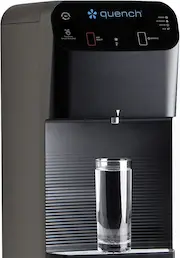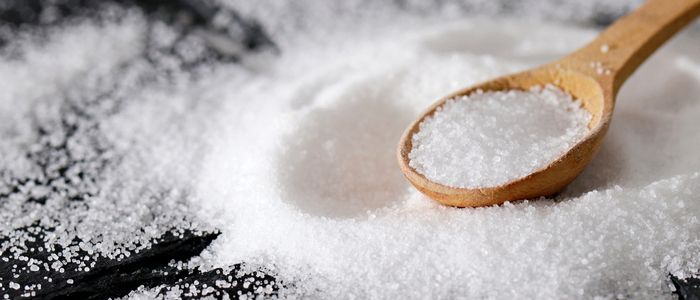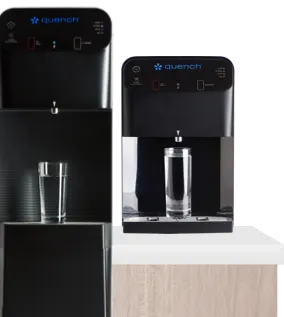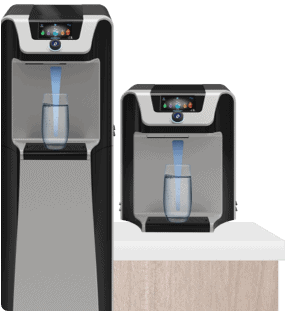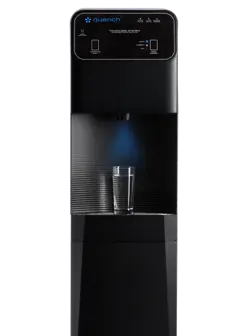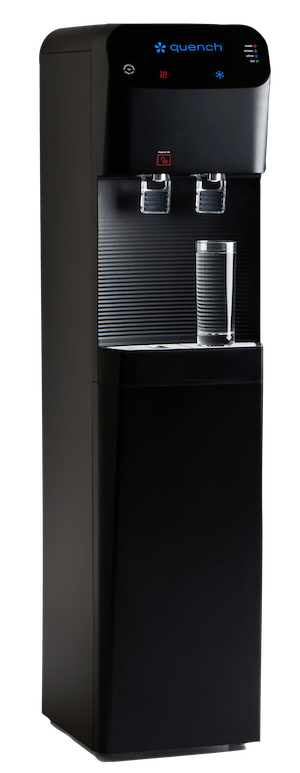If you’ve ever had a glass of water with a salty aftertaste, it could be due to the presence of chloride ions and/or sulfates in your home or workplace water supply. With over 316 contaminants found in water supplies throughout the U.S., it’s important to determine why your water has a strange taste so you can correct the problem and enjoy great-tasting water.
Quick Facts
- If your tap water has a salty aftertaste, it’s likely caused by either a high concentration of chloride ions and/or sulfates in your water supply. This is due to industrial waste, irrigation drainage, or seawater entering local reservoirs.
- While generally safe to drink, it’s important to get your water tested — as contaminants can cause damage to pipes in your home or workplace.
- Get your water tested by your local Water Testing Lab, which you can find here.
- If your water comes from a private source, such as a well, you may need to take additional steps, which can be found here.
What Makes Tap Water Taste Salty?
There are a few possible reasons why your water may taste like salt:
1. Chlorine
The most likely cause is a high concentration of chloride ions in your water source. Some common causes of high chloride levels in your water may be industrial waste or irrigation drainage. Those who live in coastal areas may experience this problem due to seawater entering a local water supply. In addition to producing a salty taste, chloride ions can corrode pipes and discolor stainless steel sinks.
2. Sulfates
Another possible cause behind your water’s salty taste is a high concentration of sulfates. Sulfates such as magnesium sulfate and sodium sulfate can cause water to taste like saline. These sulfates may occur naturally in some types of soil and rocks. As groundwater or rainwater moves through the earth, naturally occurring sulfites potentially enter the local water supply. This is especially the case during winter when melting snow and rain are more likely to carry road salt runoff into reservoirs.
Sulfate may also appear in your water supply as the result of industrial waste, shale, or the breakdown of sulfide ores. In addition to a strange taste, the presence of greater than 500 mg/L of sulfates in water can produce a laxative effect in those who drink it.
3. Reverse Osmosis Mishaps
A reverse osmosis (RO) filtration system can also sometimes inadvertently lead to salty water. How? RO systems work by forcing water through a semipermeable membrane to remove impurities, including salts and minerals. However, if the system’s membrane is damaged or worn out, it may allow some salt to pass through, resulting in a salty taste in the water. Additionally, if the system’s salt reservoir is not regulated correctly or if too much salt is added during the filtration process, it can significantly increase the salt concentration in the treated water, making it taste salty.
How Do You Fix Salty Tap Water?
Not only is water with a salty aftertaste unpleasant to consume, but it can also damage your pipes and boilers. Although it’s not likely hazardous to humans, high levels of sulfates in your drinking water can also cause diarrhea. Additionally, individuals on a sodium-sensitive diet should speak with their physicians and may want to take extra precautions if their water has a salty aftertaste.
Find the Source
If your water has a saline taste to it, it’s best to have it tested to determine the source of the problem. Identifying the source of your salty water is crucial for recognizing the appropriate steps to resolve the issue, as each situation may demand a unique solution. How can you confidently pinpoint the cause of your salty water?
- Visit the EPA website to find a water testing lab in your area.
- If your water comes from a private well and not a public drinking supply, the EPA might not have the authority to test your water. In this case, here are the additional steps to get your water tested.
Install a Water Softener
A water softener can effectively reduce the concentration of salts in your water by replacing calcium and magnesium ions (which contribute to hardness) with sodium ions. This process helps improve your water quality while preventing scale buildup in appliances and plumbing fixtures — prolonging their lifespan.
Introduce a Layered Filtration System
Multiple filtration systems can significantly reduce the likelihood of experiencing salty-tasting water or water with impurities. By incorporating layered filtration stages, each designed to target specific contaminants, such systems ensure the removal of a wide range of substances — and salt is no exception.
For instance, our quenchWATER+ filtration system consists of a sediment filter to remove larger particles, followed by activated carbon filtration to adsorb organic compounds and chlorine. Finally, a RO membrane effectively eliminates dissolved salts and minerals and a mineral addback component ensures you don’t lose any flavor in the process.
Improve Water and Filtration System Maintenance
Ensure that your water systems, such as pipes and faucets, are properly maintained to prevent the introduction of additional salts into your water supply. Regular inspections and repairs of leaks or corrosion can help preserve water quality and minimize the risk of salt contamination.
At the same time, it’s crucial to maintain your filtration systems regularly. This ensures optimal performance and longevity, preventing potential issues and maintaining water quality for your workplace or household needs. By keeping the filters clean and functioning efficiently, maintenance prevents the buildup of salts and other contaminants that can affect the taste of your water, ensuring that it remains fresh for consumption.
Consult With Water Quality Experts
If you’re not sure what the right solution is for your needs, it can be helpful to speak with a water quality expert. These professionals can conduct comprehensive water testing, analyze the results, and provide expert guidance on the most appropriate treatment options for your unique circumstances — including any salty water problems.
Improving Your Drinking Water
Local water quality varies from zip code to zip code. So, beyond salt and saline, your local tap water might contain other impurities, which could impact the taste and smell of your water. Our mission at Quench is to deliver fresh, clean drinking water to all offices and commercial spaces, regardless of your local water quality.
With our quenchWATER+ 5-filter setup, UV technology, and other advanced filtration technologies, you can rest assured your drinking water is delicious and clean. Try our product finder to get matched with the best water filtration system for your unique needs.
